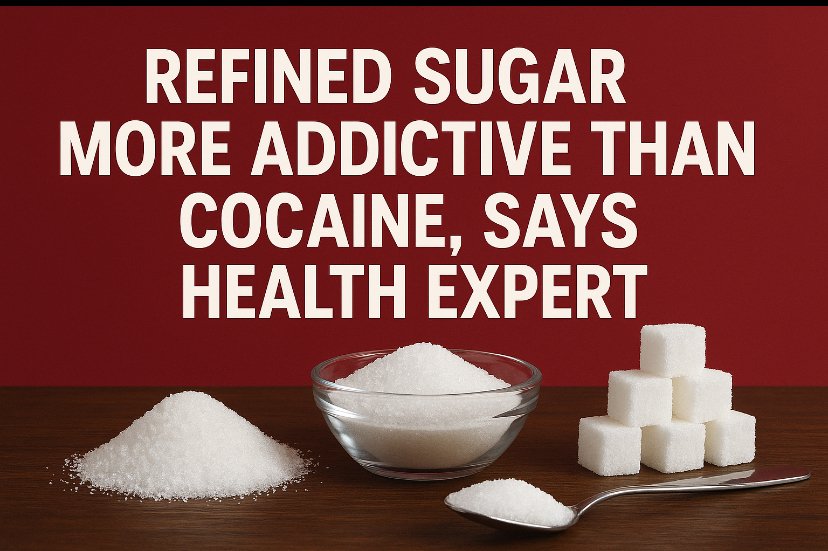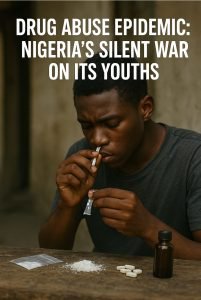Addiction: Expert Warns Refined Sugar is Deadlier Than Drugs

By Editorial Team
When a health expert describes refined sugar as more addictive than cocaine, it is no longer a casual debate. It is a serious warning. Professor Alero Roberts, an Associate Professor and consultant at Lagos University Teaching Hospital (LUTH), recently shook the nation when she declared that refined sugar is destroying lives quietly, even more than many illegal drugs.
Speaking on Channels Television’s Health Matters, she explained that while not all sweet foods are harmful, refined sugar is dangerous because it causes obesity, weakens the body, and traps people in addiction without them even realising it.
Her words may sound extreme, but the reality is clear: Nigerians, especially children and youths, are consuming sugar in dangerous amounts, and the nation may be sitting on a hidden health time bomb.
Why Refined Sugar is a Silent Killer
Unlike cocaine, which is illegal and heavily policed, refined sugar is freely available in every shop, market, and roadside kiosk. It hides in soft drinks, biscuits, packaged snacks, sweets, bread, and even processed cereals. Because it is cheap and easy to access, many Nigerians do not see it as a problem.
But experts insist that refined sugar behaves like a drug in the brain. It releases chemicals that give pleasure, and when the body is denied it, withdrawal symptoms appear headaches, mood swings, irritability, and even shaking. Just like cocaine addicts, sugar lovers struggle to quit, making it a slow but powerful addiction.
Children in Danger
One of the most worrying parts of Prof. Roberts’ warning is the link between refined sugar and childhood obesity. Across Nigeria, children are now drinking more fizzy drinks than water, snacking on biscuits instead of fruits, and eating processed foods daily.
The result is alarming: young children developing obesity, diabetes, and hypertension, diseases once considered only for adults. Some schools have already banned pupils from bringing sweetened drinks and processed snacks, insisting on only water and natural foods. But the fight is far from over, because outside the school gates, children are surrounded by cheap sugary temptations.
If nothing is done, Nigeria may face a generation of sick adults before they even reach 30 years old.
The Addiction Nobody Talks About
Most people associate addiction with hard drugs like cocaine, heroin, or cannabis. But sugar addiction is just as real, though more socially accepted. People drink three bottles of soda in one sitting and call it normal. Children cry for sweets daily, and parents provide them without thinking twice.
Prof. Roberts made it clear: try cutting out refined sugar for three days, and your body will fight back. You will feel weak, angry, and restless. This withdrawal process shows how addictive sugar truly is. Unfortunately, unlike cocaine, sugar is encouraged by advertising, media, and even cultural practices where every event must be filled with cakes, sweets, and soft drinks.
The Burden on Nigeria’s Health System
The consequences of sugar addiction are already reflecting in Nigerian hospitals. Cases of diabetes, hypertension, kidney disease, heart attack, and stroke are increasing daily. Many of these conditions are linked to poor diet and excessive sugar intake.
The burden on Nigeria’s fragile health system is massive. Treating diabetes and its complications costs families millions of naira every year. Hospitals are overwhelmed, and many patients cannot afford proper care. If the addiction to sugar is not controlled, the healthcare system may collapse under the weight of preventable diseases.
Natural Alternatives Are Better
Prof. Roberts was quick to clarify that not all sweet things are harmful. Locally available fruits like oranges, pineapples, bananas, and honey are safe and even beneficial. The danger lies in processed sugar, which has no nutritional value and only weakens the body.
She encouraged parents to replace fizzy drinks with natural fruit juice or water, and to introduce children to fruits as snacks instead of processed biscuits. By choosing natural alternatives, families can protect themselves while still enjoying sweetness.
Healthy Lifestyle
The fight against sugar addiction is not only about avoiding sweet foods. It is also about building a healthy lifestyle. Prof. Roberts advised Nigerians to combine good nutrition with regular exercise, enough sleep, and reduction in processed foods.
She stressed that at least three hours of exercise per week can change a person’s health. Even simple walking is better than sitting all day. For office workers, she advised getting up every hour from the desk to stretch, and including weightlifting in daily routines for stronger muscles and bones.
Her message is clear: avoiding sugar is important, but without a balanced lifestyle, the danger will remain.
The Role of Parents and Schools
Parents have a critical role to play. Many times, children eat what parents provide. If the house is full of soft drinks, sweets, and biscuits, children will consume them without question. Parents must set the example by cutting down sugar in family meals.
Schools also have a role. Some have already banned processed drinks and snacks. Others need to follow. By controlling what children eat in school, habits can be shaped early, reducing future risks.
Government and Policy Failure
The Nigerian government cannot continue to ignore this crisis. Just as it taxes alcohol and cigarettes, there should be stronger regulation on sugar. Countries like Mexico and South Africa have imposed sugar taxes on soft drinks, forcing companies to reduce sugar levels and encouraging citizens to choose healthier options.
Public health campaigns must also be intensified. Just as adverts warn against smoking, Nigerians should see warnings about excessive sugar. Hospitals, community centers, and religious institutions should join in the campaign for healthier living.
Without policy action, the sugar industry will continue to profit while Nigerians suffer in silence.
Nigerians Must Wake Up
The truth is bitter, but it must be faced: refined sugar is more addictive than cocaine, and it is silently destroying Nigeria. While cocaine users are few and heavily punished by law, sugar addicts are everywhere, smiling as they sip their soft drinks without knowing the danger.
Children are falling into obesity, youths are battling hidden addictions, and adults are developing diseases that cut their lives short. The cost to families, the economy, and the health system is too high to ignore.
Parents must take responsibility, schools must protect pupils, government must regulate, and individuals must choose healthier lifestyles. The fight against sugar addiction is not just about food, it is about saving lives and securing the nation’s future.







